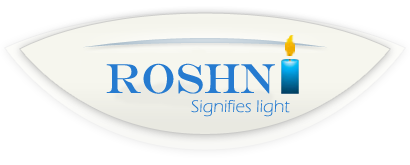Achievements

ROSHNI’s Role With Women’s Development Programs
Government Of Tamil Nadu And The Muslim Woman
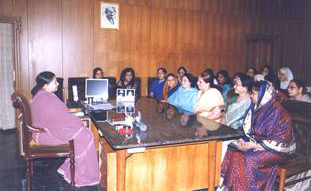
March 19, 2002 is a memorable landmark in the annals of ROSHNI and for the Muslim Women of Tamil Nadu. A delegation of Muslim women of several educational institutions of the city inclusive of the members of ROSHNI led by the Secretary of the ROSHNI – Ms. Bader Sayeed was given an audience by Hon’ble Dr Selvi J Jayalalithaa, Chief Minister, Government of Tamil Nadu.
The scheduled meeting took place at the Secretariat of the Government of Tamil Nadu at the Chief Minister’s office. Dr Selvi J Jayalalithaa spent a considerable amount of time and promised to support the causes of Muslim women and aid ROSHNI in their projects.
ROSHNI’s Activities At The Regional, National And International Level
![]() ROSHNI networks with other NGOs’ in India and in the region that have similar objectives in empowering women with particular emphasis directed towards women of the minority community. ROSHNI organizes and conducts workshops, seminars and conferences to promote its objectives.
ROSHNI networks with other NGOs’ in India and in the region that have similar objectives in empowering women with particular emphasis directed towards women of the minority community. ROSHNI organizes and conducts workshops, seminars and conferences to promote its objectives.
![]() Holds public hearing of marginalized women and also submits position papers concerning minority women to national and international bodies.
Holds public hearing of marginalized women and also submits position papers concerning minority women to national and international bodies.
![]() ROSHNI conducts programmes like Self Help Groups towards Adult Literacy, economic and social empowerment of women, training programmes and helping them with employment opportunities, giving them a secular approach to live harmoniously within their community, neighborhood and society.
ROSHNI conducts programmes like Self Help Groups towards Adult Literacy, economic and social empowerment of women, training programmes and helping them with employment opportunities, giving them a secular approach to live harmoniously within their community, neighborhood and society.
ROSHNI With Penn Urumai Iyakkam
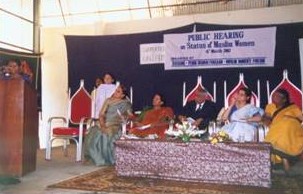 ROSHNI with Penn Urumai Iyakkam, Muslim Women’s Forum jointly organised a public hearing for Muslim Women, on 4′h March 2002 at Mahakavi Bharathiar Ninaivu Illam. Ms. Qudsia Gandhi, IAS, Chairman and Managing Director, Tamil Nadu Corporation for Development of Women Ltd., inaugurated the program.
ROSHNI with Penn Urumai Iyakkam, Muslim Women’s Forum jointly organised a public hearing for Muslim Women, on 4′h March 2002 at Mahakavi Bharathiar Ninaivu Illam. Ms. Qudsia Gandhi, IAS, Chairman and Managing Director, Tamil Nadu Corporation for Development of Women Ltd., inaugurated the program.
Honorable Justice J.Kanakaraj Former Judge, High Court, Chennai .presided over the function. Ms. Sayeeda Saiyidain Hameed of Muslim Women’s Forum, and Sohra Mehdi from Delhi made introductory remarks. The programme constituted four sessions on education and employment, health and housing, violence against women each session followed by depositions and ruling and the last sessions had responses of the Judges of the public hearing and concluding remarks.
For the Muslim Women, the hearing was an opportunity to pour their pent-up agonies. From the harassment by their husbands and in-laws to the lack of drinking water facility and proper roads, the women came out with a litany of woes. Obviously they were happy that the voices were being heard atleast now.
Tobacco Campaign
Six years ago, all 2,500 families in the South Indian village of Pattur supported themselves by rolling beedis, small, unfiltered cigarettes. Today, only 250 families earn their living this way. Meanwhile, the number of companies that collect Pattur beedis has dropped from five to three in the last year, and the incidence of beedi smoking in the village is down 60 percent. CECHE, with Chennai-based NGOs’ ROSHNI, has been conducting a Tobacco Control Communications Program in Pattur, South India.
The program provides vocational training and job placement in non-tobacco trades for families. It also offers incentives to refrain from tobacco-related activities.
CECHE’s program was launched on September 14, 2004 in partnership with ROSHNI. The program is based in Pattur, a village near Chennai, with a population of some 2000 families and whose main source of income derived from rolling tobacco leaves to make beedis for smoking. The village population was heavily engaged in making beedis and had a high prevalence of beedi smoking, even among young children. The primary goal of this project has been to create an awareness of the health hazards of smoking among the village population and to train selected members of the population, especially women, in skills suitable for non-tobacco trades. ROSHNI and CECHE are jointly supporting this effort.
5th Pillar – Right To Information
![]() A seminar was organized by ROSHNI with the 5th Pillar for the awareness of members and the members of ROSHNI’s Self Help Group.
A seminar was organized by ROSHNI with the 5th Pillar for the awareness of members and the members of ROSHNI’s Self Help Group.
![]() 5th Pillar is a non-profit citizens’ coalition formed with the mission to Encourage, Enable and Empower Every Citizen of India to Eliminate Corruption at All Levels of Society.
5th Pillar is a non-profit citizens’ coalition formed with the mission to Encourage, Enable and Empower Every Citizen of India to Eliminate Corruption at All Levels of Society.
![]() 5th Pillar has been enabling citizens by way of public awareness programs, training and workshops to use the Right to Information (RTI) Act to enable transparency in government departments.
5th Pillar has been enabling citizens by way of public awareness programs, training and workshops to use the Right to Information (RTI) Act to enable transparency in government departments.
ROSHNI Public Hearing On The Situation Of Minority Women
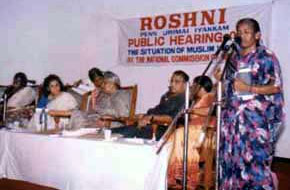 National Commission for Women, New Delhi, sponsored a public hearing for minority women, at the World University Service Centre, Chennai on 4th June 1998.
National Commission for Women, New Delhi, sponsored a public hearing for minority women, at the World University Service Centre, Chennai on 4th June 1998.
The deliberations were far reaching and useful. As a follow up action, The National Commission for Women, New Delhi organised a review of this public enquiry on 27th & 28th of December 1999 at Chennai.
It is a matter of great pride that ROSHNI was the first organisation to conduct such a session, a fruitful attempt to rescue the minority women who are victims of family harassment. Also the National Commission for Women, New Delhi featured this event in its report on status of Muslim women in India.
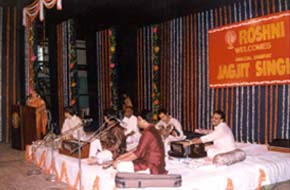
Jagjit Singh At A Fund Raising Event For ROSHNI
Jagjit A fund raising program undertaken by ROSHNI during our nascent stage, early 1997.
